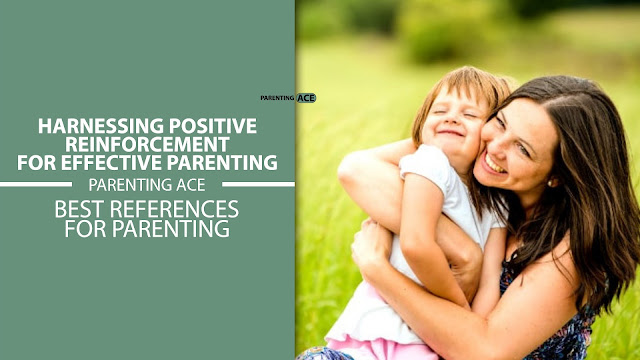Unlocking the Power of Positive Reinforcement in Effective Parenting
Unlocking the potential of positive reinforcement in parenting opens doors to a transformative journey of growth and connection. In this blog post, we delve into the profound impact of positive reinforcement as a cornerstone of effective parenting strategies. From understanding its mechanisms to exploring practical applications in everyday parenting, join us as we illuminate the path toward fostering resilient, confident, and compassionate individuals through the power of positivity.
 |
| Harnessing Positive Reinforcement for Effective Parenting |
Parenting is often likened to navigating a maze: a complex journey filled with twists, turns, and unexpected challenges. Amidst this labyrinth, parents seek effective strategies to guide their children toward growth, resilience, and happiness. One such strategy, renowned for its efficacy, is positive reinforcement. In this article, we delve into the depths of positive reinforcement as a cornerstone of effective parenting strategies, exploring its mechanisms, benefits, and practical applications in nurturing thriving parent-child relationships.
Understanding Positive Reinforcement
Positive reinforcement operates on the principle of behavioral psychology, wherein desirable behaviors are strengthened through the application of positive stimuli or rewards. Unlike punishment, which focuses on deterring unwanted behaviors through negative consequences, positive reinforcement accentuates the positive, amplifying behaviors that parents wish to encourage in their children. It creates an environment where children feel motivated, valued, and empowered to repeat behaviors that lead to favorable outcomes.
The Mechanisms of Positive Reinforcement
At its core, positive reinforcement operates through a simple yet powerful mechanism: reward and recognition. When a child exhibits a desired behavior—whether it's completing chores, showing kindness to others, or excelling academically—parents provide immediate and meaningful reinforcement. This could be in the form of verbal praise, a tangible reward, or additional privileges. By associating positive actions with favorable outcomes, children learn to internalize these behaviors, fostering long-term habits and character development.
The Benefits of Positive Reinforcement
The benefits of positive reinforcement extend far beyond immediate behavior modification. By emphasizing strengths and successes, rather than dwelling on shortcomings, positive reinforcement nurtures a child's self-esteem and confidence. It fosters a positive parent-child dynamic built on trust, respect, and open communication. Furthermore, research suggests that children raised in environments rich in positive reinforcement exhibit higher levels of motivation, resilience, and emotional well-being.
Practical Applications in Everyday Parenting
Implementing positive reinforcement in everyday parenting requires intentionality, consistency, and adaptability. Start by identifying specific behaviors or goals you wish to reinforce, whether it's completing homework on time, demonstrating empathy, or showing responsibility in household chores. Establish clear expectations and communicate them effectively to your child, emphasizing the importance of positive actions.
Next, devise a system of rewards that aligns with your child's interests, preferences, and developmental stage. This could range from verbal praise and encouragement to tangible rewards such as stickers, privileges, or special activities. Remember to tailor the rewards to your child's individual needs and preferences, ensuring they feel motivated and valued.
Consistency is key in reinforcing desired behaviors. Be prompt and consistent in delivering praise and rewards whenever your child exhibits the targeted behavior. Additionally, provide constructive feedback and guidance when necessary, helping your child understand the connection between their actions and the positive outcomes they experience.
Lastly, remain flexible and adaptive in your approach to positive reinforcement. Children's interests, motivations, and developmental needs evolve over time, requiring adjustments to your reinforcement strategies accordingly. Stay attuned to your child's cues, preferences, and challenges, adapting your approach to suit their unique personality and circumstances.
Positive reinforcement stands as a beacon of light in the realm of effective parenting strategies, illuminating the path toward nurturing resilient, confident, and compassionate individuals. By harnessing the power of positive reinforcement, parents can cultivate environments of encouragement, support, and growth, laying the groundwork for lifelong success and fulfillment in their children's lives. So, let us embark on this journey of positivity, celebrating each step forward and empowering our children to reach their fullest potential.




